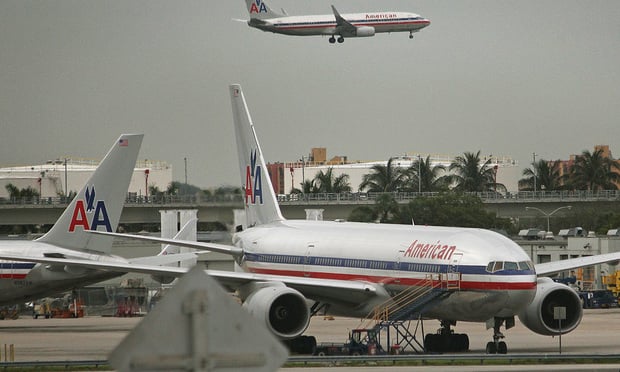Does Miami-Dade's Living Wage Ordinance Apply to Airport Contractors? Appeal Court Says No
The Third District Court of Appeal rules that although Ultra Aviation Services Inc. operates at the county-owned Miami International Airport, the company is not subject to Miami-Dade's living wage ordinance because it works for private companies, not the county.
February 15, 2019 at 05:26 PM
4 minute read
 Miami International Airport. Photo: Photo: J. Albert Diaz/ALM.
Miami International Airport. Photo: Photo: J. Albert Diaz/ALM.
The Third District Court of Appeal ruled Miami-Dade County can't enforce its living wage ordinance on Ultra Aviation Services Inc., a contractor at Miami International Airport, in response to a challenge from a part-time employee.
The living wage was established in 1999 to help citizens stay above the poverty line, according to the county's website, which says all aviation service contractors are covered.
But the court found that while Ultra leases space and conducts business at the county-owned airport, it doesn't directly serve Miami-Dade. Instead, it serves private airlines through separate, noncounty contracts, meaning it's exempt from the ordinance.
The question arose when employee Lisvan L. Cruz Clemente brought a lawsuit against Ultra in May 2017, alleging it reduced his hours and threatened to fire him after he complained about his wages. Cruz's suit claimed the airport's pay and health insurance plan for part-time workers was out of step with Miami-Dade County's ordinance.
Under the LWO, employers can either pay a higher wage without providing health insurance, or pay a lower wage and use the difference to provide coverage.
In 2017, Miami's living wage was $15.52 without health insurance and $12.63 with coverage, according to the complaint. Ultra paid Cruz Clemente the lower amount, but he claimed health insurance doesn't meet Affordable Car Act standards.
Ultra moved to dismiss the complaint, claiming it complies with the ordinance even though it's preempted by Florida statute section 218.077, which dictates that municipalities can't impose their own minimum wages or benefits.
Miami-Dade County intervened with a third-party complaint against Ultra, asking the court to find that its ordinance isn't preempted and that its health care requirements are invalid.
Miami-Dade Circuit Judge Rodney Smith ruled the ordinance was constitutional and applied to Ultra, which appealed. And though the Third DCA didn't dispute the ordinance's validity, but ruled it doesn't apply to Ultra.
The opinion issued Wednesday analyzed the language in the statute considered its exceptions, including Miami-Dade County and vendors contracted to provide goods and services to, for or on behalf of the county, but found Ultra didn't fit.
Related story: Business Groups Fight Higher Miami Beach Minimum Wage
Judge Eric Hendon wrote the opinion, backed by Chief Judge Kevin Emas and Judge Vance E. Salter.
 Miguel De Grandy, Holland & Knight's Miami office. Courtesy photo.
Miguel De Grandy, Holland & Knight's Miami office. Courtesy photo.Counsel to Ultra, Miguel De Grandy of Holland & Knight in Miami, agreed with the decision.
“If the facts are that our contract is with Avianca and we're providing services to that airline, [the county] is not in privity of that contract, not a third-party beneficiary to that contract and, as a matter of fact, the permit says it's limited to the exclusive privilege of being able to solicit that business from other parties,” De Gandy said.
De Grandy pointed out that Ultra continues to meet the ordinance's standards, even though it doesn't have to.
“It's unfortunate that we had to litigate that issue when the facts show that we were voluntarily compliant,” De Grandy said.
Cruz Clemente's attorney, Brian H. Pollock of the Fairlaw Firm in Kendall, said he was disappointed with the decision and expects his client and Miami-Dade County will ask the court for a rehearing en banc.
“Our concern, like the concern of Dade County, is for the thousands of workers at the airport who are relying on the living wage ordinance to provide them with a wage that they can live on,” Pollock said. “The court's ruling effectively strips away that protection for so many hard-working men and women.”
Pollock has also launched a putative class action seeking damages on behalf of 600 Ultra employees — a case he fears may now be in jeopardy following this ruling. That lawsuit alleges Ultra's health insurance for part-time employees doesn't comply with the living wage.
Pollock said he worries that the ruling will allow entities with a permit to operate at the airport to pay “any wage they would like, as long as it meets the Florida minimum wage” — which was raised to $8.46 per hour in January.
Miami-Dade County Attorney Abigail Price-Williams and assistant attorneys David M. Murray, Cynji A. Lee and Altanese Phenelus declined to comment on the case.
Read the full court opinion:
This content has been archived. It is available through our partners, LexisNexis® and Bloomberg Law.
To view this content, please continue to their sites.
Not a Lexis Subscriber?
Subscribe Now
Not a Bloomberg Law Subscriber?
Subscribe Now
NOT FOR REPRINT
© 2025 ALM Global, LLC, All Rights Reserved. Request academic re-use from www.copyright.com. All other uses, submit a request to [email protected]. For more information visit Asset & Logo Licensing.
You Might Like
View All
Plaintiffs Attorneys Awarded $113K on $1 Judgment in Noise Ordinance Dispute
4 minute read
As Unpredictability Rises, Gov't Law Practices Expect Trump Bump. Especially in Florida
5 minute read

Trending Stories
- 1Big Law Firms Sheppard Mullin, Morgan Lewis and Baker Botts Add Partners in Houston
- 2Lack of Jurisdiction Dooms Child Sex Abuse Claim Against Archdiocese of Philadelphia, says NJ Supreme Court
- 3DC Lawsuits Seek to Prevent Mass Firings and Public Naming of FBI Agents
- 4Growth of California Firms Exceeded Expectations, Survey of Managing Partners Says
- 5Blank Rome Adds Life Sciences Trio From Reed Smith
Who Got The Work
J. Brugh Lower of Gibbons has entered an appearance for industrial equipment supplier Devco Corporation in a pending trademark infringement lawsuit. The suit, accusing the defendant of selling knock-off Graco products, was filed Dec. 18 in New Jersey District Court by Rivkin Radler on behalf of Graco Inc. and Graco Minnesota. The case, assigned to U.S. District Judge Zahid N. Quraishi, is 3:24-cv-11294, Graco Inc. et al v. Devco Corporation.
Who Got The Work
Rebecca Maller-Stein and Kent A. Yalowitz of Arnold & Porter Kaye Scholer have entered their appearances for Hanaco Venture Capital and its executives, Lior Prosor and David Frankel, in a pending securities lawsuit. The action, filed on Dec. 24 in New York Southern District Court by Zell, Aron & Co. on behalf of Goldeneye Advisors, accuses the defendants of negligently and fraudulently managing the plaintiff's $1 million investment. The case, assigned to U.S. District Judge Vernon S. Broderick, is 1:24-cv-09918, Goldeneye Advisors, LLC v. Hanaco Venture Capital, Ltd. et al.
Who Got The Work
Attorneys from A&O Shearman has stepped in as defense counsel for Toronto-Dominion Bank and other defendants in a pending securities class action. The suit, filed Dec. 11 in New York Southern District Court by Bleichmar Fonti & Auld, accuses the defendants of concealing the bank's 'pervasive' deficiencies in regards to its compliance with the Bank Secrecy Act and the quality of its anti-money laundering controls. The case, assigned to U.S. District Judge Arun Subramanian, is 1:24-cv-09445, Gonzalez v. The Toronto-Dominion Bank et al.
Who Got The Work
Crown Castle International, a Pennsylvania company providing shared communications infrastructure, has turned to Luke D. Wolf of Gordon Rees Scully Mansukhani to fend off a pending breach-of-contract lawsuit. The court action, filed Nov. 25 in Michigan Eastern District Court by Hooper Hathaway PC on behalf of The Town Residences LLC, accuses Crown Castle of failing to transfer approximately $30,000 in utility payments from T-Mobile in breach of a roof-top lease and assignment agreement. The case, assigned to U.S. District Judge Susan K. Declercq, is 2:24-cv-13131, The Town Residences LLC v. T-Mobile US, Inc. et al.
Who Got The Work
Wilfred P. Coronato and Daniel M. Schwartz of McCarter & English have stepped in as defense counsel to Electrolux Home Products Inc. in a pending product liability lawsuit. The court action, filed Nov. 26 in New York Eastern District Court by Poulos Lopiccolo PC and Nagel Rice LLP on behalf of David Stern, alleges that the defendant's refrigerators’ drawers and shelving repeatedly break and fall apart within months after purchase. The case, assigned to U.S. District Judge Joan M. Azrack, is 2:24-cv-08204, Stern v. Electrolux Home Products, Inc.
Featured Firms
Law Offices of Gary Martin Hays & Associates, P.C.
(470) 294-1674
Law Offices of Mark E. Salomone
(857) 444-6468
Smith & Hassler
(713) 739-1250






